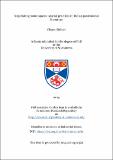Files in this item
Negotiating home spaces: spatial practices in Italian postcolonial literature
Item metadata
| dc.contributor.advisor | Duncan, Derek | |
| dc.contributor.author | Giuliani, Chiara | |
| dc.coverage.spatial | 253 p. | en_US |
| dc.date.accessioned | 2016-11-04T10:33:17Z | |
| dc.date.available | 2016-11-04T10:33:17Z | |
| dc.date.issued | 2015 | |
| dc.identifier.uri | https://hdl.handle.net/10023/9764 | |
| dc.description.abstract | This thesis analyses a selection of Italian postcolonial novels from a spatial perspective, exploring the ways in which specific spaces come to play crucial roles in the narration. By investigating the work of Cristina Ali Farah, Gabriella Kuruvilla, Amara Lakhous and Igiaba Scego, this work aims to examine the strategies through which characters – who are either migrants themselves or have migrant parents – appropriate certain spaces, in the attempt to recreate feelings of home. Through a geocritical approach, I explore the ways in which the absence of home leads to the creation of a multiplicity of home spaces; pivotal in this sense are the processes of remembering through which the spaces selected are compared, displaced and experienced not only on a different geographical level but also on a different temporal dimension. The first part concentrates on public places; despite being imbued with familiar values, they become contested spaces exactly because of the presence of migrants. The sharing of these spaces with Italians without migrant origins leads the discussion to a wider issue: the inclusion/exclusion of migrants from Italian society. The analysis of journalistic sources and of the way they portray these same sites (in a situation of both social and physical decay), is indispensable in order to provide a thorough account of these spaces’ role. The second part focuses on private spaces; in particular exploring the way characters transform their dwellings into proper home spaces through a range of strategies. I focus on very specific and circumscribed spaces and to the reasons why they play a fundamental part in the narration. However, if on the one hand the spatial analysis gradually narrows its focus by looking at more circumscribed spaces, on the other it broadens the sociological analysis of the characters’ behaviours not as migrants but as human beings. | |
| dc.language.iso | en | en_US |
| dc.subject.lcc | PQ4053.E45G5 | |
| dc.subject.lcsh | Italian literature|xHistory and criticism--21st century | en_US |
| dc.subject.lcsh | Italian literature--History and criticism--20th century | en_US |
| dc.subject.lcsh | Immigrants in literature | en_US |
| dc.subject.lcsh | Postcolonialism | en_US |
| dc.subject.lcsh | ||
| dc.subject.lcsh | ||
| dc.title | Negotiating home spaces: spatial practices in Italian postcolonial literature | en_US |
| dc.type | Thesis | en_US |
| dc.contributor.sponsor | University of St Andrews. School of Modern Languages | en_US |
| dc.type.qualificationlevel | Doctoral | en_US |
| dc.type.qualificationname | PhD Doctor of Philosophy | en_US |
| dc.publisher.institution | The University of St Andrews | en_US |
| dc.rights.embargoreason | Embargo period has ended, thesis made available in accordance with University regulations | en_US |
| dc.identifier.doi | https://doi.org/10.17630/10023-9761 |
This item appears in the following Collection(s)
Items in the St Andrews Research Repository are protected by copyright, with all rights reserved, unless otherwise indicated.

